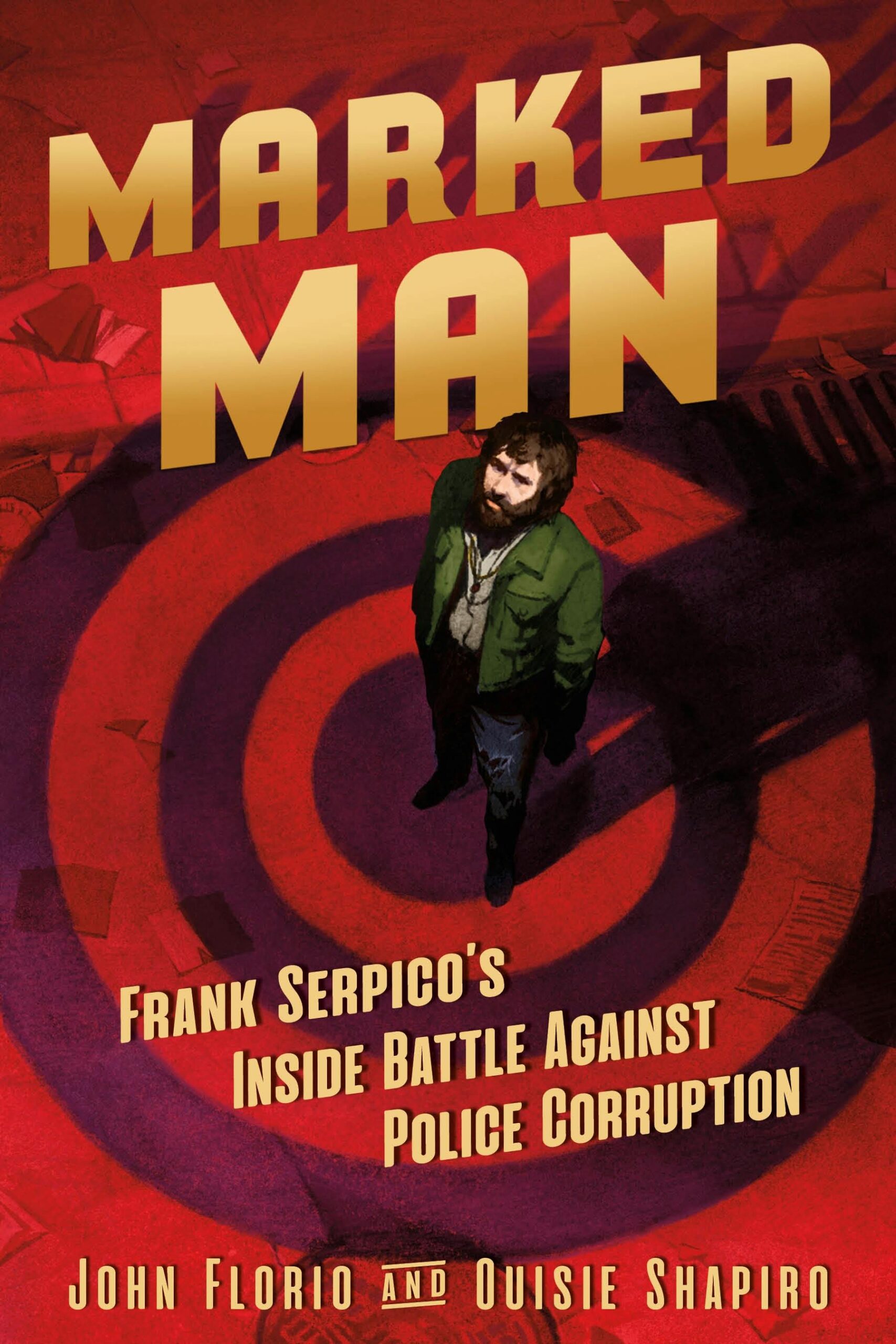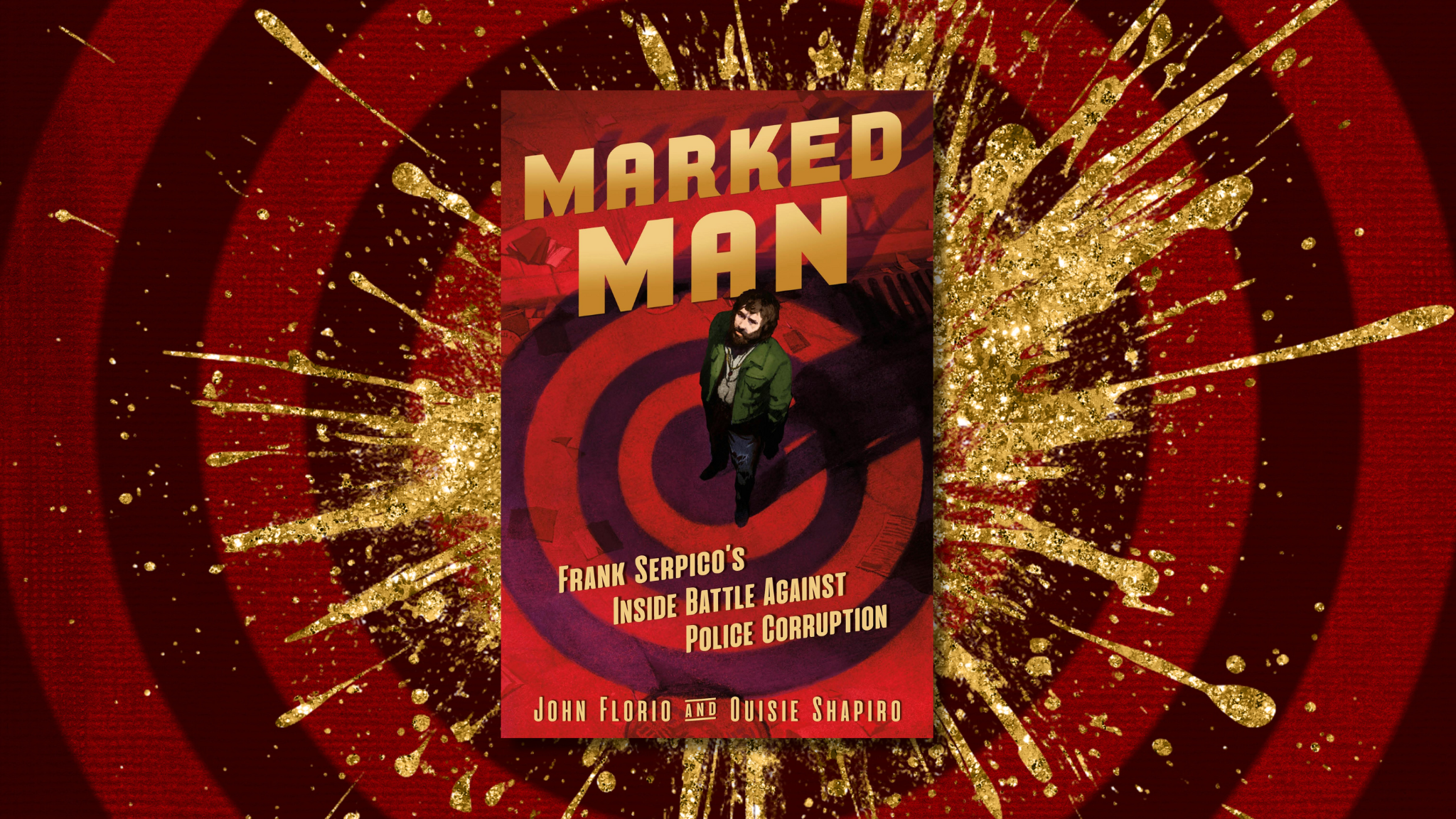Frank Serpico’s Inside Battle Against Police Corruption by John Florio and Ouisie Shapiro
What's It About?
Join Frank Serpico on his one-man crusade to clean up the largest police force in the United States. And discover the price he had to pay for being an honest cop.“Police, more often than not, have their own moral code, an “us against them” attitude enforced by a blue wall of silence, which can be even stronger than the omertà, the code of silence in the Mafia.” —Frank Serpico
John Florio and Ouisie Shapiro have written a vitally important young adult book, titled Marked Man: Frank Serpico’s Inside Battle against Police Corruption (Roaring Brook Press). Lest he be forgotten by the younger generations for his unflinching adherence to a strong code of ethics, courage, heroism and personal sacrifices to help clean up the New York Police Department, the authors are keeping the flame burning brightly for this veteran police officer.
Breaking The “Blue Wall Of Silence”
Frank Serpico received death threats and nearly lost his life in the line of duty when he was shot and left for dead, saved by a civilian who made an emergency call. He broke the “Blue Wall of Silence”, the tacit agreement not to reveal any wrongdoings by the brotherhood of policemen. Retaliation for whistleblowers in any profession has often been swift, punitive and sometimes deadly, particularly among those working in the criminal justice system. He bravely exposed widespread graft, bribery, theft, racketeering, gross misconduct and other abuses that existed from the rank and file on up the chain of command.
This fine work of non-fiction chronicles Frank Serpico’s career beginning with his early days as one of New York’s finest, his growing frustration with the systemic corruption within the force and the seeming willingness by top brass to ignore the multiple instances he witnessed and attempted to report to them. Ultimately, he felt compelled to publicly expose the extent of these egregious instances of criminal behavior within the NYPD becoming a “Lamplighter, a person who shines a light on things that are wrong.” It’s the term he prefers to whistleblower.
Honesty And Respect For The Law
Francesco Vincent Serpico (born April 14, 1936) and his three older siblings were born in Brooklyn, New York to parents who emigrated from Naples. His father owned a small shoe repair shop where young Frank worked as a shoe shine boy. His parents instilled a strong work ethic, honesty and respect for the law in their children. Frank learned about the arrogant expectation of “benefits” by some beat cops at an early age after one walked out without payment or even thanks for polishing his shoes. The next time this cop appeared, the boy demanded a dime before doing the job which resulted in his walking out and never returning.
After graduating from high school, Frank served two years in the U.S. Army stationed in Korea but his lifelong goal remained earning a detective’s shield with the NYPD. He worked as a youth counselor while attending college studying criminal justice at Brooklyn College and later earned a Bachelor of Science Degree from NY City College. Finally, on September 11, 1959, he began to realize his dream of becoming a rookie probationary patrolman with the NYPD and was sworn in as a full member the following March. Initially assigned to Brooklyn’s 81st precinct, he rotated through the Burroughs, the Bureau of Criminal Identification and Plainclothes Units in the Bronx’s 7th Division and Manhattan North before returning to the narcotics division in Brooklyn.
An Eccentric Hero
Serpico did not win any popularity contests as he aroused ire and suspicion from his fellow officers for his refusal to share in bribes from various gambling operations, protection monies or even to partake in coffee or meals “on the arm” (police parlance for “gifts” from small businesses). During the years he served, Italian Americans were mistrusted and disliked in the predominantly Irish NYPD. At 5’9”, slender with a wiry build, he was the antithesis of a burly cop.
In lieu of the traditional blue uniform, his attire was eccentric even by undercover work standards. He wore his hair long, grew a beard, sported an earring, blue jeans, work shirts and a leather jacket. While carrying out his duties, he demonstrated tremendous acts of heroism, delivering babies and saving several people from a rapidly burning apartment building without receiving any official recognition.
Meanwhile, after a one-man crusade of amassing documentation of systemic wrongdoing in the 7th Division, in 1967 he reported this information to Police Captain Cornelius Behan who had the ear of First Deputy Commissioner John Walsh, the second most powerful policeman in the city. Walsh had been called by the New York Times, “the biggest shoo-fly of them all”. Shoo-fly is defined as a police officer who investigates other cops suspected of wrongdoing.
He was disheartened not to be called to meet with the Commissioner or Mayor Lindsay. Serpico was unwilling to name a handful of corrupt lower-ranking officers as the entire plainclothes detail was dirty “going up the ladder.” In April, 1970, frustrated by the total lack of response from the Police Commissioners, Serpico contributed to a major front-page article in the New York Times about widespread corruption in the NYPD.
At the time, only Chicago’s police department was recognized as having a larger corruption problem. From lesser offenses like taking food ”on the arm”, “cooping” (sleeping) on the job while ostensibly on patrol to shaking down drug dealers for cash and/or narcotics, they were skimming millions from high-profile gangsters, criminals and taxpayers alike. Many cops were actually taking home more money from their illegal cut (the “pad” or “nut”) than from their jobs while accruing a pension.
Near-Death Experience and Accusations
Frank Serpico became ostracized by his peers, who considered him a “rat”. After being shot in 1971 while attempting an arrest of a suspected drug dealer in a Brooklyn apartment building, none of his NYPD peers turned out at Greenpoint Hospital to donate blood. Normally, fellow officers would have lined up to do so. Many displayed overt antipathy and some of the policemen guarding his room harassed him. He nearly died from blood loss and was left with permanent hearing loss in one ear and bullet fragments in his brain. It was a miracle he survived.
National attention from the article pushed Mayor John Lindsay to appoint a five-member panel, the Knapp Commission, to investigate the accusations. Frank Serpico, bravely, openly and still recovering from his wounds was the first member of the NYPD to testify about the widespread corruption payoffs. This solidified his status as a target, a Marked Man. His testimony was broadcast on NYC’s public television station. Authors John Florio and Ouisie Shapiro have included his concluding remarks and recommended changes in their entirety.
His testimony and the 2.5-year investigation by the Knapp Commission did produce tangible results; 1134 officers were found guilty of corruption and 59 officers were fired. Lasting changes were slower in coming. The National Whistleblower Center (NWC) was founded in 1988 to safeguard those reporting abuses from fear of retaliation.
The Commission to Combat Police Corruption (CCPC) is a permanent board created in 1995 to independently monitor and evaluate the anti-corruption programs put into place by the NYPD. The mission statement of the more recently founded non-profit organization The Lamplighter “encourages whistleblowing activity in law enforcement by removing barriers to reporting, preventing retaliation, and elevating ethical officers.”
Vow to Protect and Serve
Frank Serpico believed in and adhered to the credo of “Protect and Serve”, the NYPD oath to uphold the U.S. Constitution and swore to uphold the Law Enforcement Oath of Office. It states: “On my honor, I will never betray my integrity, my character or the public trust. I will always have the courage to hold myself and others accountable for our actions. I will always maintain the highest ethical standards and uphold the values of my community, and the agency I serve.”
After he recovered from his physical wounds, Frank Serpico retired on disability in June 1972. He was awarded the New York City Police Department Medal of Honor, the highest law enforcement medal in the NYPD in 1972 but significantly, without the official certificate or ceremony. When Paco (Serpico’s nickname) walked out the station door for the last time a fellow cop asked him what he was going to do, to which he replied simply “I’m going to live.” He packed his belongings and along with his sheepdog Alfie relocated to the Netherlands for a decade.
In 1973, New York journalist Peter Maas wrote the best-selling biography Serpico: The Cop Who Defied the System. The motion picture Serpico directed by Sidney Lumet debuting in December 1973 received wide acclaim and in the titular role, Al Pacino earned an Academy Award nomination.
In 2017, director Antonino D’Ambrosio made Frank Serpico, a feature-length documentary with the subject relating his own story on camera. A highly regarded lecturer, Serpico has testified on numerous occasions about police corruption and retaliatory responses by officers. In the more than 50 years since his retirement, he has protected his privacy while living with art, books, and music and for many years has resided in a rural part of New York State.
The Writing Team Behind the Novel
John Florio and Ouisie Shapiro have collaborated on several books including three for Young Adults: War in the Ring, Doomed: Sacco, Vanzetti & the End of the American Dream, and now the recently published Marked Man: Frank Serpico’s Inside Battle Against Police Corruption. Doomed received rave reviews and several notable honors including being named as A School Library Journal Best Book of the Year, Notable Social Studies Trade Book by the National Council for Social Studies and was a Junior Library Guild Gold Standard Selection.
Ouisie Shapiro is also a journalist and sports documentarian who has won six Emmy Awards for screenwriting while husband John Florio pens gripping novels as well as inspirational nonfiction books, newspaper and magazine articles. Characteristic of these writers, Marked Man was extensively researched and documented with a glossary of police terminology, chapter notes, a several-page bibliography as well as image credits and an index. Most importantly, they sought and received the cooperation of Frank Serpico through numerous lengthy interviews who additionally endorsed the book by contributing his own introduction.
His comments and observations along with personal photographs are interwoven throughout Marked Man. On the acknowledgment page, the authors’ state: “The story is not ours; it belongs to Frank Serpico. He was and still is a hero, a dedicated cop with the crazy notion to stand up for what’s right. His is a story young people need to know and he generously helped us tell it. Thank you, Paco.” This concise, well written and compelling true story serves as a morality lesson whose appeal should exceed the confines of the Young Adult category. Inclusion in the curriculum of police academies and criminal justice classes would be warranted. It would make it an ideal subject for book discussion groups.
John Florio, a native New Yorker, grew up in the household of an honest cop, his father, late Manhattan Precinct NYPD Captain William Florio who was, in his own words, “a shoo-fly” who reported directly to Commissioner John Walsh. He did not meet Frank Serpico but did take his 12-year-old boy to see the film Serpico when it was shown in New York. He told this reviewer his dad said, “Serpico did the right thing.”
About the Authors:
 John Florio and Ouisie Shapiro are the authors of Marked Man: Frank Serpico’s Inside Battle Against Police Corruption. Their previous books include Doomed, War in the Ring, One Nation Under Baseball, and One Punch from the Promised Land. They also write for The New York Times, The New Yorker, The Atlantic, The Nation, and ESPN. John and Ouisie are married and live in Brooklyn, NY.
John Florio and Ouisie Shapiro are the authors of Marked Man: Frank Serpico’s Inside Battle Against Police Corruption. Their previous books include Doomed, War in the Ring, One Nation Under Baseball, and One Punch from the Promised Land. They also write for The New York Times, The New Yorker, The Atlantic, The Nation, and ESPN. John and Ouisie are married and live in Brooklyn, NY.
John is the author of the historical crime novels, Sugar Pop Moon and Blind Moon Alley. He holds an MFA from the University of Southern Maine, an MA from New York University, an MBA from St. John’s University, and he is currently pursuing a DFA at the University of Glasgow. John is on the faculty of the Stonecoast MFA creative writing program at the University of Southern Maine.

Ouisie is a six-time Emmy award-winning writer/producer of sports documentaries. Her TV credits include ESPN’s Playing for the Mob, and HBO’s Dare to Dream, Breaking the Huddle, and Nine Innings from Ground Zero. She is the author of three children’s books (Batter Up!, Autism & Me, and Bullying & Me), and holds an MA in journalism from New York University.
Related Posts:
Two Immigrants Unveil an Unjust Justice System in Heartbreaking Nonfiction Story
Riveting Prohibition-Era Noir Novels Reprinted in Classic Crime Editions





